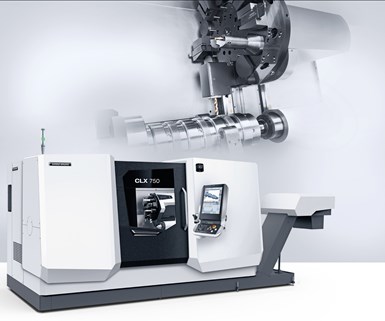DMG MORI's CLX 750 Turning Center Designed for Long-Shaft Work
DMG MORI’s CLX 750 universal turning center is designed for workpieces weighing up to 600 kg and measuring 1,290 mm in length.
Share






DMG MORI’s
CLX 750 universal turning center is designed for workpieces weighing up to 600 kg and measuring 1,290 mm in length. In addition to its dimensions, the machine’s control and IoTConnector technology are said to make the CLX 750 well-suited for production environments.
The machine’s 1,290-mm turning length and maximum turning diameter of 700 mm (or 640 mm for the Y-axis version) provide versatility for a range of applications, but with a focus on long shafts. An optional steady rest supports shaft turning operations with diameters ranging to 430 mm. A Y-axis traverse distance of ±80 mm is available for the eccentric machining of complex workpieces, while a subspindle enables six-sided complete machining. The CLX 750 uses an InlineMaster spindle with 2,000 Nm of torque and 46 kW of power.
Several features are intended to enable users to adapt more easily to developments in the digitalization of machining. Advanced 3D control technology from Siemens or FANUC is available. DMG MORI’s alternating rotational speed, Easy Tool Monitor 2.0 and Multi-Threading Cycle technologies are said to enable easier and more efficient machining. The IoTConnector enables digital networking of machines, provides an integrated firewall and offers service solutions with ServiceCamera and NetService.
Related Content
-
3 Tips to Accelerate Production on Swiss Lathes with Micro Tools
Low RPM lathes can cause tool breakage and prevent you from achieving proper SFM, but live tooling can provide an economical solution for these problems that can accelerate production.
-
Industry Analysis: Machining Semiconductor Components
With many machine shops anticipating long-term growth in demand from the semiconductor industry, it is worth the time to heed the advice of manufacturers who have already been servicing this end-market for years.
-
4 Commonly Misapplied CNC Features
Misapplication of these important CNC features will result in wasted time, wasted or duplicated effort and/or wasted material.























